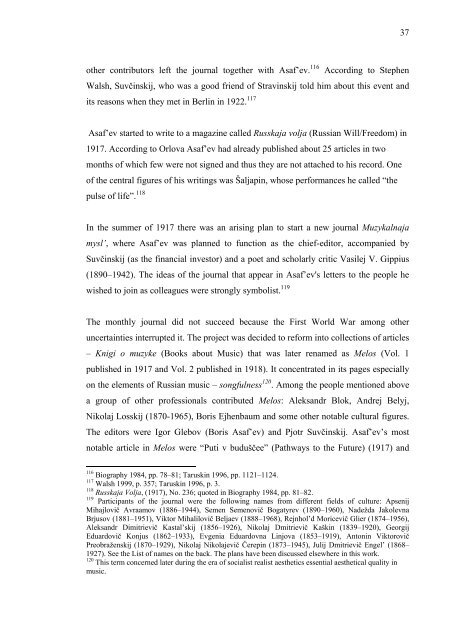Boris Asaf'ev and the Soviet Musicology - E-thesis
Boris Asaf'ev and the Soviet Musicology - E-thesis
Boris Asaf'ev and the Soviet Musicology - E-thesis
Create successful ePaper yourself
Turn your PDF publications into a flip-book with our unique Google optimized e-Paper software.
o<strong>the</strong>r contributors left <strong>the</strong> journal toge<strong>the</strong>r with Asaf’ev. 116 According to Stephen<br />
Walsh, Suvčinskij, who was a good friend of Stravinskij told him about this event <strong>and</strong><br />
its reasons when <strong>the</strong>y met in Berlin in 1922. 117<br />
Asaf’ev started to write to a magazine called Russkaja volja (Russian Will/Freedom) in<br />
1917. According to Orlova Asaf’ev had already published about 25 articles in two<br />
months of which few were not signed <strong>and</strong> thus <strong>the</strong>y are not attached to his record. One<br />
of <strong>the</strong> central figures of his writings was Šaljapin, whose performances he called “<strong>the</strong><br />
pulse of life”. 118<br />
In <strong>the</strong> summer of 1917 <strong>the</strong>re was an arising plan to start a new journal Muzykalnaja<br />
mysl’, where Asaf’ev was planned to function as <strong>the</strong> chief-editor, accompanied by<br />
Suvčinskij (as <strong>the</strong> financial investor) <strong>and</strong> a poet <strong>and</strong> scholarly critic Vasilej V. Gippius<br />
(1890–1942). The ideas of <strong>the</strong> journal that appear in Asaf’ev's letters to <strong>the</strong> people he<br />
wished to join as colleagues were strongly symbolist. 119<br />
The monthly journal did not succeed because <strong>the</strong> First World War among o<strong>the</strong>r<br />
uncertainties interrupted it. The project was decided to reform into collections of articles<br />
– Knigi o muzyke (Books about Music) that was later renamed as Melos (Vol. 1<br />
published in 1917 <strong>and</strong> Vol. 2 published in 1918). It concentrated in its pages especially<br />
on <strong>the</strong> elements of Russian music – songfulness 120 . Among <strong>the</strong> people mentioned above<br />
a group of o<strong>the</strong>r professionals contributed Melos: Aleks<strong>and</strong>r Blok, Andrej Belyj,<br />
Nikolaj Losskij (1870-1965), <strong>Boris</strong> Ejhenbaum <strong>and</strong> some o<strong>the</strong>r notable cultural figures.<br />
The editors were Igor Glebov (<strong>Boris</strong> Asaf’ev) <strong>and</strong> Pjotr Suvčinskij. Asaf’ev’s most<br />
notable article in Melos were “Puti v buduščee” (Pathways to <strong>the</strong> Future) (1917) <strong>and</strong><br />
116<br />
Biography 1984, pp. 78–81; Taruskin 1996, pp. 1121–1124.<br />
117<br />
Walsh 1999, p. 357; Taruskin 1996, p. 3.<br />
118<br />
Russkaja Volja, (1917), No. 236; quoted in Biography 1984, pp. 81–82.<br />
119<br />
Participants of <strong>the</strong> journal were <strong>the</strong> following names from different fields of culture: Apsenij<br />
Mihajlovič Avraamov (1886–1944), Semen Semenovič Bogatyrev (1890–1960), Nadežda Jakolevna<br />
Brjusov (1881–1951), Viktor Mihalilovič Beljaev (1888–1968), Rejnhol’d Moricevič Glier (1874–1956),<br />
Aleks<strong>and</strong>r Dimitrievič Kastal’skij (1856–1926), Nikolaj Dmitrievič Kaškin (1839–1920), Georgij<br />
Eduardovič Konjus (1862–1933), Evgenia Eduardovna Linjova (1853–1919), Antonin Viktorovič<br />
Preobraženskij (1870–1929), Nikolaj Nikolajevič Čerepin (1873–1945), Julij Dmitrievič Engel’ (1868–<br />
1927). See <strong>the</strong> List of names on <strong>the</strong> back. The plans have been discussed elsewhere in this work.<br />
120<br />
This term concerned later during <strong>the</strong> era of socialist realist aes<strong>the</strong>tics essential aes<strong>the</strong>tical quality in<br />
music.<br />
37

















